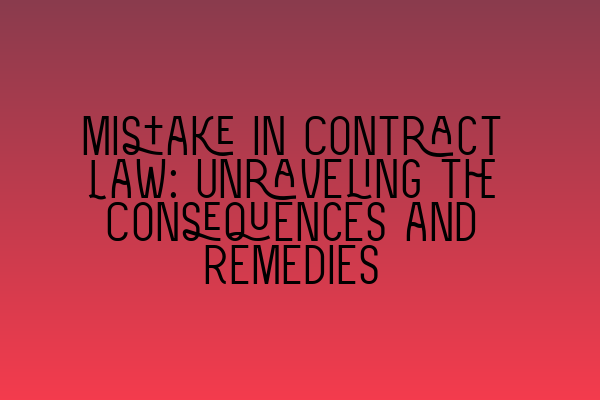Mistake in Contract Law: Unraveling the Consequences and Remedies
In the intricate world of contract law, mistakes can have far-reaching consequences. Any error or oversight during the creation of a contract can potentially lead to disputes and legal entanglements. It is therefore crucial for solicitors and legal professionals to fully understand the concept of mistake in contract law, its implications, and the available remedies. In this article, we delve into the depths of mistake in contract law, shedding light on its various forms, consequences, and the remedies that can be pursued.
Types of Mistakes in Contract Law
Mistakes in contracts can take several forms, including mutual mistake, unilateral mistake, and common mistake. Each type presents its own unique challenges and implications, requiring careful analysis to determine the appropriate course of action.
1. Mutual Mistake: This type of mistake occurs when both parties to a contract are mistaken about a fundamental aspect of the agreement. For example, if both parties mistakenly believe that a specific item being sold is in perfect condition when it is, in fact, flawed, a mutual mistake has been made. In such cases, the existence of a mutual mistake can potentially render the contract voidable.
2. Unilateral Mistake: Unlike mutual mistake, a unilateral mistake involves only one party being mistaken about a fundamental element of the contract. For instance, if a buyer mistakenly believes that he is purchasing an original painting by a renowned artist, but later discovers it to be a forgery, a unilateral mistake has occurred. In such situations, the mistaken party may seek remedies such as rescission, rectification, or damages.
3. Common Mistake: A common mistake arises when both parties make a mistake regarding a fundamental assumption underlying the contract. This assumption can be about the subject matter of the agreement or a basic condition upon which the contract is contingent. A common mistake can potentially render the contract void ab initio (from the beginning), releasing both parties from their obligations. However, certain exceptions and limitations apply, making it essential to seek legal advice to ascertain the precise consequences and remedies available.
Consequences of Mistake in Contract Law
The consequences of a mistake in contract law depend on several factors, including the type of mistake, the significance of the error, and the intentions of the parties involved. In some cases, a mistake may render the contract voidable, allowing the mistaken party to seek remedies such as rescission, rectification, or damages.
1. Rescission: Rescission refers to the cancellation or termination of a contract. In cases where a mistake renders a contract voidable, the mistaken party may choose to rescind the contract. Rescission aims to put both parties back in their pre-contractual positions, effectively undoing the legal consequences of the agreement.
2. Rectification: When a mistake results in a contract that does not accurately reflect the true agreement reached by the parties, rectification may be sought. Rectification entails correcting the mistakes made in the contract to align it with the true intentions of the parties. This remedy aims to achieve the original agreement that the parties intended, rather than enforcing an erroneous contract.
3. Damages: In some cases, a mistaken party may seek damages as a remedy for the losses suffered due to the mistake. Damages are typically awarded to compensate the injured party for any financial or other losses incurred as a result of the mistake. However, the availability of damages as a remedy may vary depending on the nature and severity of the mistake.
Remedies for Mistake in Contract Law
When confronted with a mistake in contract law, there are several remedies that a solicitor can pursue on behalf of their client. These remedies aim to rectify the situation, compensate for any damages suffered, and ensure that justice is served.
1. Rescission and Restitution: Rescission involves canceling the contract, restoring both parties to their pre-contractual positions. Restitution refers to the return of any benefits received under the mistaken contract. Together, these remedies attempt to unravel the legal ties created by the flawed agreement.
2. Rectification: Rectification allows the court to fix the mistakes in the contract so that it reflects the true intentions of the parties involved. This remedy is particularly useful when a contract does not accurately represent what the parties had agreed to.
3. Specific Performance: In certain cases, specific performance may be sought as a remedy. This entails court-ordered enforcement of the contract, requiring the breaching party to fulfill their obligations as outlined in the original agreement. Specific performance is often pursued when a unique item, such as a piece of artwork, is involved and cannot be easily replaced.
In the complex realm of contract law, mistakes can have significant consequences. Understanding the types of mistakes, their consequences, and the available remedies is crucial for contract law professionals. Whether it is a mutual mistake, unilateral mistake, or common mistake, solicitors must carefully assess the situation and advise their clients on the most appropriate course of action.
To prepare for the SQE contract law examination and enhance your understanding of contract law principles, we recommend exploring our SQE test preparation resources. Our SQE 1 Practice Exam Questions and SQE 1 Practice Mocks FLK1 FLK2 can help you hone your knowledge and reinforce your understanding of contract law concepts. Additionally, our SQE 1 Preparation Courses and SQE 2 Preparation Courses offer comprehensive instruction and guidance for aspiring solicitors preparing to tackle the SQE exams. Stay up to date with the latest SRA SQE Exam Dates to plan your study schedule effectively.
Contract law is a fascinating and intricate field, with mistakes being just one aspect of its complexity. By delving into the consequences and remedies of mistakes in contract law, solicitors can ensure that their clients’ interests are safeguarded and that justice is served.
